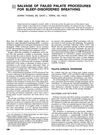 January 2019 in “International journal of dermatology, venereology and leprosy sciences”
January 2019 in “International journal of dermatology, venereology and leprosy sciences” Hair loss in young adults is common and varies in pattern, cause, and type.
 January 2019 in “Skin appendage disorders”
January 2019 in “Skin appendage disorders” A woman's hair loss was linked to a rare hormone-secreting ovarian tumor, treated with surgery and hair loss medication.
 November 2018 in “Annals of oncology”
November 2018 in “Annals of oncology” A scalp-cooling system effectively prevents hair loss in breast cancer patients treated with eribulin.
August 2018 in “Archives on veterinary science and technology” Hair loss in lab macaques is not always due to neglect and has multiple causes.
 July 2018 in “Elsevier eBooks”
July 2018 in “Elsevier eBooks” The most common cause of hair loss in children is tinea capitis, followed by alopecia areata and telogen effluvium.
 July 2018 in “International journal of clinical & experimental dermatology”
July 2018 in “International journal of clinical & experimental dermatology” Eat a balanced diet for healthy hair; only use supplements if you have a proven nutrient deficiency.
 May 2018 in “Academic Medicine”
May 2018 in “Academic Medicine” Hair loss can cause significant emotional and psychological distress.
 January 2018 in “The Egyptian Journal of Hospital Medicine”
January 2018 in “The Egyptian Journal of Hospital Medicine” The document's conclusion cannot be provided because the document is not accessible.
Many hair loss myths lack strong evidence, but some treatments are proven to work.
PRP might be a good treatment for hair loss, but more research is needed to be sure.
January 2017 in “Nutrafoods - International Journal on Nutraceuticals, Functional Foods and Novel Foods” The supplement reduces hair loss and increases hair thickness in older women.
 October 2016 in “Iranian journal of psychiatry and behavioral sciences”
October 2016 in “Iranian journal of psychiatry and behavioral sciences” Sertraline, an antidepressant, may cause hair loss in rare cases.

The document concludes that hair loss in women is complex, often linked to aging, health conditions, and nutritional deficiencies, and emotional impacts should not be underestimated.

Mesenchymal stem cells could potentially help regenerate hair in people with hair loss.
 November 2014 in “Prescriber”
November 2014 in “Prescriber” The 16-year-old girl with hair loss was successfully treated for alopecia areata, leading to significant hair regrowth.

Pig tissue can be used to prevent hair loss, aid in hair restoration surgery, and improve healing of donor scars.
 May 2013 in “Trends in Urology & Men's Health”
May 2013 in “Trends in Urology & Men's Health” Male-pattern hair loss is normal, often involves hormone effects on hair follicles, and can be treated with medication or surgery, but new treatments are being researched.
January 2012 in “Human health handbooks” The document's conclusion cannot be provided because the document is not readable.
 January 2012 in “Elsevier eBooks”
January 2012 in “Elsevier eBooks” Hair loss can cause emotional and social issues, and various treatments, including medication, surgery, and psychological support, are needed.
 January 2012 in “Postgraduate obstetrics & gynecology”
January 2012 in “Postgraduate obstetrics & gynecology” Up to 50% of women may experience significant hair loss by age 50, with various causes and treatments available.

Early treatment is important for better hair regrowth in elderly women with hair loss.

The document concludes that hair loss in women can be treated with topical treatments or hormone therapy depending on the cause.

Hair transplants can cause hair loss if done while lichen planopilaris is active; wait until it's inactive for two years and check with a scalp biopsy first.
February 2003 in “Australasian Journal of Dermatology”  December 2002 in “Operative Techniques in Otolaryngology-Head and Neck Surgery”
December 2002 in “Operative Techniques in Otolaryngology-Head and Neck Surgery” Hair loss from trauma can be managed using scalp expansion, flaps, and hair transplants to improve appearance and well-being.
July 2002 in “Journal of cosmetic dermatology” Hair loss can be treated with medications like finasteride and surgical methods like hair transplants.
 April 1998 in “Journal of women's health”
April 1998 in “Journal of women's health” Hair loss in women is often due to hereditary conditions or stress, and while treatments like minoxidil can help, diagnosis and management require medical guidance.
September 1993 in “Archives of Disease in Childhood”  March 1983 in “Annals of Internal Medicine”
March 1983 in “Annals of Internal Medicine” 5-Aminosalicylic acid enemas may cause immediate hair root damage and hair loss.





















